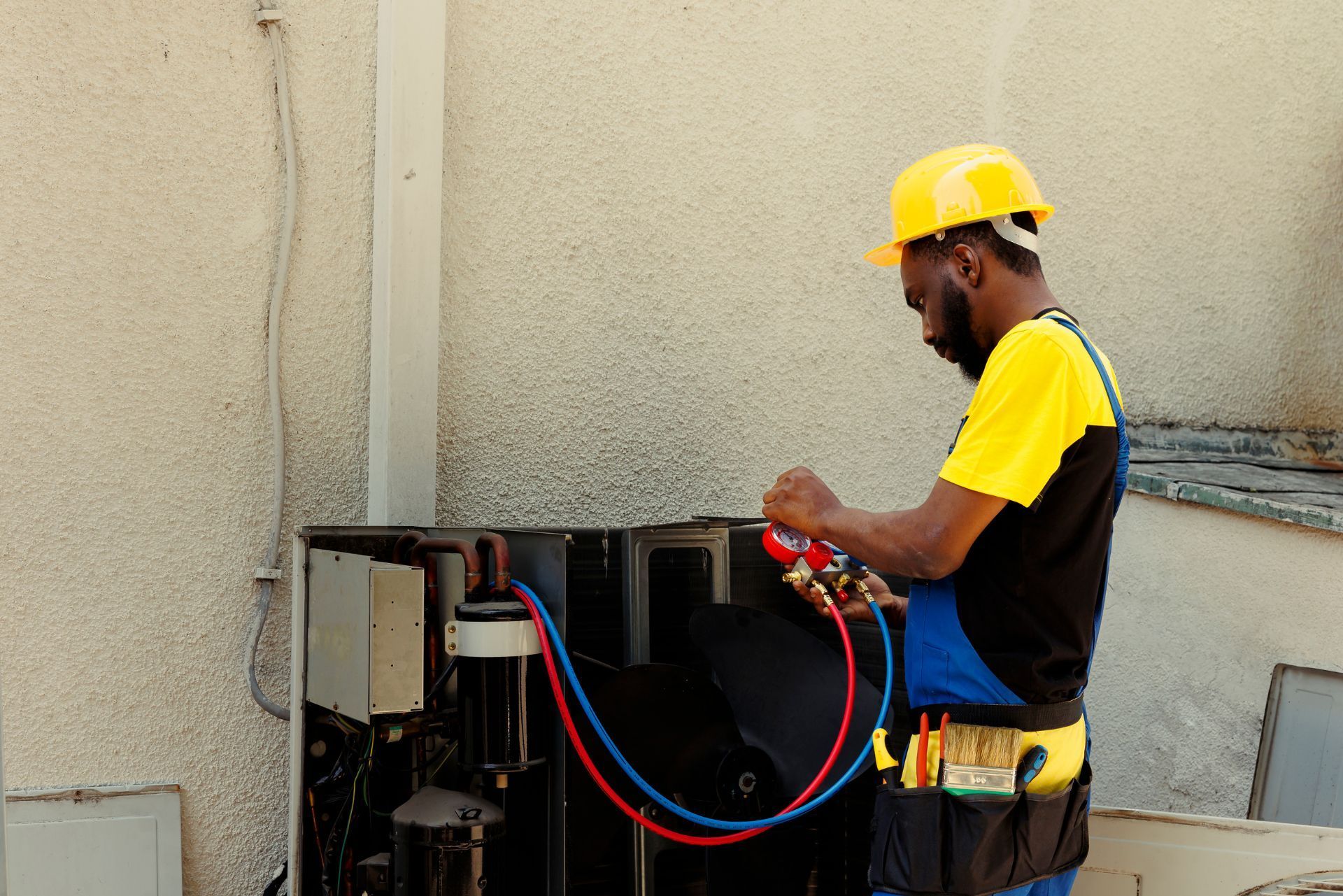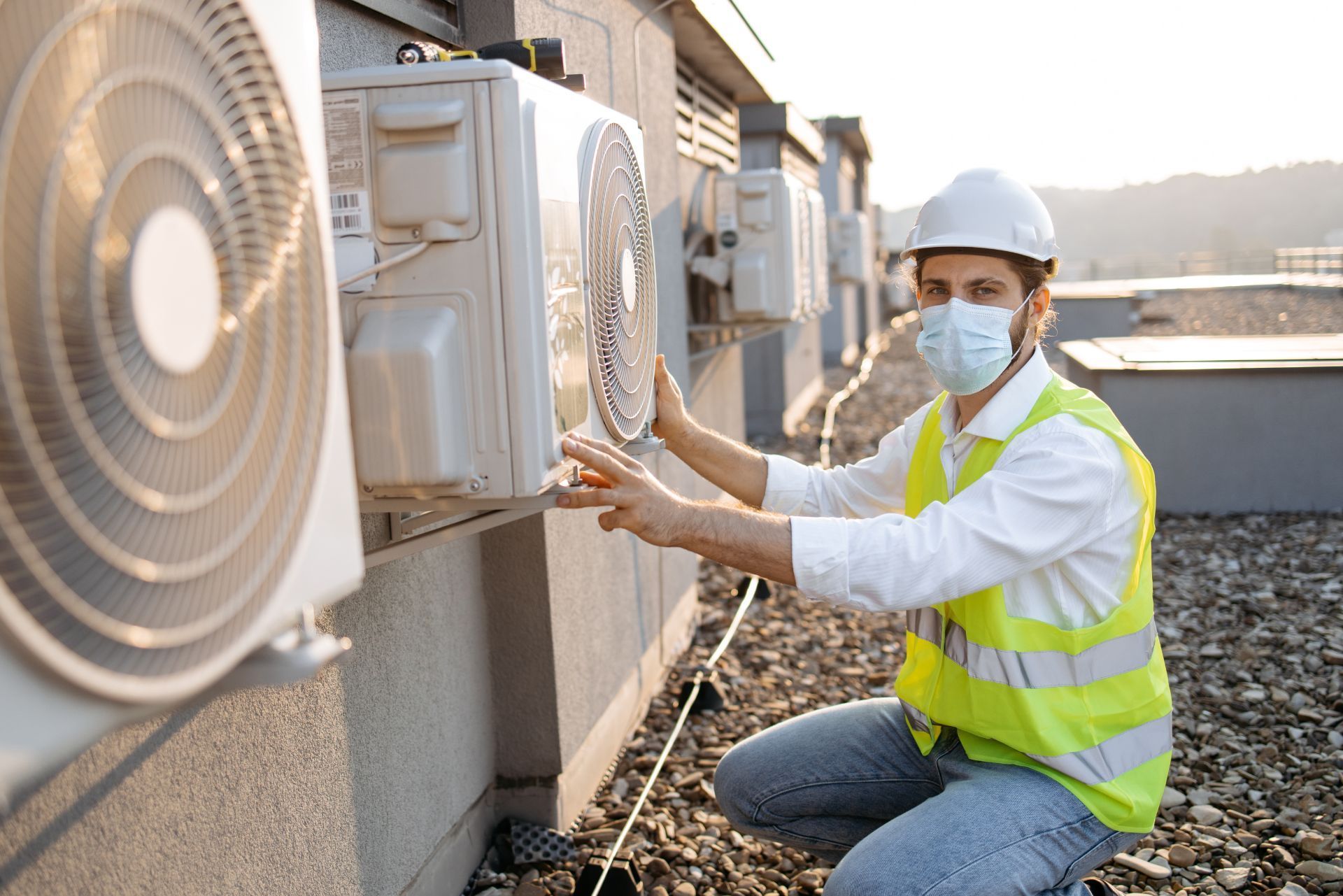Top 3 Recommended Policies

Missouri’s HVAC contractors play a key role in keeping homes and businesses comfortable through hot summers and freezing winters. But with that responsibility comes exposure to everyday risks. From property damage to workplace injuries and customer disputes, one unexpected claim can quickly impact your bottom line. Having the right insurance coverage in place helps protect your business, your employees, and your reputation. This guide explains what HVAC contractor insurance in Missouri includes, how much it typically costs, and which policies provide the most protection. With more homeowners and businesses looking for reliable service, carrying proper insurance also builds trust with clients and separates your company from less prepared competitors in a crowded market.
Whether you are a seasoned HVAC professional or just starting out, navigating insurance requirements can be daunting. With nearly 5,000 complaints processed by the Better Business Bureau in 2023 related to HVAC services, including issues like failure to perform contracted work and surprise charges, it’s clear that professionalism and transparency are vital in this industry. Proper insurance coverage not only safeguards your business but also builds trust with customers who rely on your expertise to keep their homes and workplaces comfortable. For more insights on choosing reliable HVAC contractors, the Better Business Bureau shares valuable tips.
Understanding the Essential Types of HVAC Insurance in Missouri
HVAC contractors in Missouri typically require a combination of insurance policies to cover the various risks associated with their work. The core types of insurance include general liability, property insurance, workers' compensation, commercial auto insurance, and bonds. Each serves a specific purpose and collectively they provide a safety net for contractors, employees, and clients.
General Liability Insurance protects contractors from claims related to property damage or bodily injury caused during the course of their work. For example, if a technician accidentally damages a client’s property or a visitor is injured on a job site, this insurance covers legal fees and settlement costs. This type of insurance is particularly important in the HVAC industry, where the nature of the work often involves complex systems and heavy equipment, increasing the potential for accidents. Furthermore, having general liability insurance can enhance a contractor's credibility, as clients often prefer to hire insured professionals, knowing they are protected against unforeseen events.
Workers' Compensation Insurance is mandatory for businesses that employ staff. It covers medical expenses and lost wages if an employee suffers a work-related injury or illness. In Missouri, HVAC contractors typically pay around $170 per month per employee for workers’ compensation, with a rate of $4.05 per $100 of payroll, which reflects the inherent risks of the trade. As noted by experts, carrying workers' compensation insurance is essential to protect both employees and the business from financial hardship in the event of accidents (totalworkcomp.com). Additionally, this insurance fosters a safer work environment, as it encourages employers to prioritize safety protocols and employee training, ultimately reducing the likelihood of accidents on the job.
Commercial Auto Insurance covers vehicles used for business purposes, including service vans and trucks. Since HVAC contractors often travel between job sites, this insurance is crucial to protect against accidents and liability on the road. In Missouri, where weather conditions can vary significantly, having commercial auto insurance can also cover damages related to weather-related incidents, such as hail or flooding, which can be particularly damaging to vehicles and equipment. This type of coverage not only safeguards the contractor's assets but also ensures that they can continue to operate smoothly, even when faced with unexpected challenges.
Finally, bonds may be required for certain contracts or licensing purposes, providing clients with assurance that the contractor will fulfill their obligations. Bonds act as a form of financial security, ensuring that if a contractor fails to complete a job or meet contractual terms, the client can seek compensation through the bond. This is especially important in larger projects, where the financial stakes are higher, and clients want to ensure that their investment is protected.
Understanding these essential types of insurance not only helps contractors comply with state regulations but also positions them for success in a competitive market.

How Much Does HVAC Contractor Insurance Cost in Missouri?
Insurance premiums for HVAC contractors vary based on several factors, including the size of the business, number of employees, payroll, and the scope of coverage. On average, HVAC liability insurance premiums range from 1.3% to 2.6% of annual gross revenue. For small operations earning around $150,000 annually, average premiums hover near $3,140. This range reflects the diverse risks associated with HVAC work, from installation mishaps to potential damage during maintenance services. Additionally, contractors who specialize in more complex systems or high-end installations may find their premiums skewing higher due to the increased liability involved.
Workers’ compensation insurance costs are another significant component. As mentioned earlier, Missouri HVAC contractors pay roughly $170 per month per employee, which translates to a rate of $4.05 per $100 of payroll. This cost reflects the physical demands and potential hazards of HVAC work, such as handling heavy equipment and exposure to electrical components. Furthermore, the state of Missouri has specific regulations that can affect these rates, including the classification of workers and the claims history of the business. Contractors with a history of frequent claims may see their rates increase, while those with a solid safety record might benefit from lower premiums.
Contractors should also consider the cost of commercial auto insurance and property insurance, which vary depending on the value of vehicles and equipment. For HVAC businesses that rely on multiple vehicles for transporting tools and materials, the cost of commercial auto insurance can add up quickly. Additionally, property insurance is crucial for protecting expensive equipment and inventory from theft or damage, especially in a field where tools can be both costly and essential for daily operations. While insurance costs can seem substantial, they are a necessary investment to avoid potentially devastating financial losses from accidents, lawsuits, or property damage. It’s also worth noting that many insurance providers offer bundled policies, which can provide comprehensive coverage at a reduced rate, making it easier for HVAC contractors to manage their insurance needs effectively.
Why Insurance Is Critical for HVAC Contractors and Their Customers
Insurance is not just a regulatory requirement for many HVAC contractors; it is a cornerstone of professional responsibility. Customers increasingly seek contractors who demonstrate reliability and accountability, especially given the high demand for HVAC services during peak seasons like summer. According to industry experts, ensuring that air conditioning systems are inspected and maintained before the heat sets in is crucial, making trustworthy contractors highly sought after (ky3.com).
Having proper insurance coverage reassures clients that the contractor is prepared to handle unforeseen incidents without passing costs onto them. It also protects the contractor from liability claims that could jeopardize their business. With nearly 5,000 complaints about HVAC contractors filed with the Better Business Bureau in 2023, many related to work not performed as contracted or unexpected charges, maintaining transparent insurance policies helps build trust and a positive reputation.
Moreover, insurance supports employee welfare by covering medical costs and lost wages if injuries occur on the job. This not only complies with Missouri state laws but also fosters a safer and more secure working environment. A well-insured contractor is more likely to invest in training and safety measures, knowing that they have a safety net in place. This commitment to safety can lead to reduced workplace accidents, which ultimately benefits both the employees and the customers they serve.
In addition to liability and worker's compensation insurance, HVAC contractors should also consider obtaining property insurance to protect their tools and equipment. The nature of HVAC work often requires expensive machinery and specialized tools that can be vulnerable to theft or damage. By securing property insurance, contractors can ensure that they can quickly replace any lost equipment, minimizing downtime and maintaining service continuity for their clients. This proactive approach not only safeguards the contractor's investment but also enhances customer satisfaction, as clients can rely on timely and efficient service even in the face of unexpected challenges.

How Homeowners Choose HVAC Contractors and the Role of Insurance
When selecting an HVAC contractor, homeowners often prioritize trust and proven reliability. A recent survey revealed that 73% of homeowners choose contractors they have used before—a 44% increase from the previous year. This trend highlights the importance of building long-term relationships through quality service and professionalism (achrnews.com).
Word of mouth remains the dominant advertising method for HVAC contractors, with 78% reporting it as their primary channel, marking a 35% increase from the prior year. This underscores how reputation and customer satisfaction drive business growth in this sector.
Insurance plays a subtle but vital role in this dynamic. Contractors who are fully insured signal to customers that they are professional and prepared, which can be a deciding factor when homeowners weigh their options. Transparent communication about insurance coverage can differentiate a contractor in a competitive market.
Moreover, homeowners are increasingly aware of the risks associated with hiring uninsured contractors. In many cases, if an accident occurs during installation or maintenance, the homeowner could be held liable for damages or injuries. This concern often leads to a thorough vetting process, where homeowners not only check for insurance but also seek out contractors with a solid history of safety and compliance. Additionally, many homeowners are now looking for contractors who offer warranties on their work, as this adds another layer of assurance that the job will be done correctly and that any potential issues will be addressed without additional cost.
The digital age has also transformed how homeowners research and choose HVAC contractors. Online reviews and ratings on platforms like Google, Yelp, and specialized service directories provide a wealth of information at their fingertips. Homeowners can easily compare contractors based on customer feedback, service offerings, and even pricing. This shift towards digital transparency means that contractors must maintain a strong online presence and actively manage their reputations, as a single negative review can significantly impact potential business. As such, many HVAC companies are investing in customer service training and follow-up processes to ensure that they not only meet but exceed customer expectations, fostering loyalty and repeat business.
Tips for Missouri HVAC Contractors to Manage Insurance Effectively
Managing insurance effectively requires more than just purchasing policies. Contractors should regularly review their coverage to ensure it matches their current business size and scope. As a business grows, insurance needs may change, especially with additional employees or new types of services offered. It's essential to conduct annual assessments of your insurance portfolio, taking into account any new equipment, changes in project scope, or shifts in the workforce. This proactive approach can help identify gaps in coverage that could leave the business vulnerable to unforeseen risks.
It is also advisable to work with insurance providers who specialize in HVAC or construction industries. These providers understand the unique risks and can tailor policies accordingly. Additionally, contractors should maintain clear documentation and training programs to minimize workplace accidents and claims. Regular safety training sessions not only promote a culture of safety but also demonstrate to insurers that the business is committed to reducing risks, which can lead to lower premiums. Furthermore, implementing a comprehensive safety program can enhance employee morale and productivity, creating a win-win situation for both the workforce and the business.
Finally, staying informed about Missouri state regulations regarding insurance requirements can prevent costly penalties and legal issues. For example, workers’ compensation insurance is mandatory for employers, and failure to comply can result in fines or business shutdowns. Contractors should also be aware of any changes in local laws or industry standards that may affect their insurance obligations. Engaging with local trade associations can provide valuable resources and updates on regulatory changes, ensuring that contractors remain compliant while also networking with peers who can share best practices in risk management and insurance strategies.
Conclusion: Protecting Your Missouri HVAC Business with the Right Insurance
Insurance is an indispensable part of running a successful HVAC contracting business in Missouri. From general liability to workers’ compensation and commercial auto insurance, these policies provide essential protection against the risks inherent in the trade. Understanding the costs, coverage options, and legal requirements helps contractors make informed decisions that safeguard their operations and build customer confidence.
In an industry where reputation and reliability are paramount, having comprehensive insurance coverage not only protects your business financially but also strengthens your standing with clients. As the demand for HVAC services continues to grow, especially during peak seasons, being fully insured positions contractors to meet customer expectations and navigate challenges with confidence.
For further information on Missouri HVAC insurance options and to ensure your business is adequately covered, consulting specialized insurance providers and industry resources is highly recommended.
Contact Us
HVACInsure is fully licensed and permitted to sell contractor and commercial insurance in Missouri.
We proudly serve clients throughout Missouri and maintain partnerships with local Missouri insurance carriers to ensure HVAC professionals receive compliant, affordable, and comprehensive coverage that meets project and regulatory requirements.
HVACInsure Focuses on Missouri HVAC Contractor Insurance
Kansas City – St. Louis – Springfield – Columbia – Independence – Lee's Summit – O'Fallon – St. Joseph – St. Charles – St. Peters – Blue Springs – Florissant – Joplin – Chesterfield – Jefferson City – Cape Girardeau – Wildwood – University City – Ballwin – Raytown – Liberty – Wentzville – Kirkwood – Maryland Heights – Hazelwood
Frequently Asked Question
Common HVAC Contractor Insurance Questions in Missouri
These FAQs address common contractor questions. As HVACInsure grows, we will update this section with real client experiences and answers.
How does Missouri's position spanning two climate zones affect my insurance?
Missouri sees humid summers and cold winters. We structure comprehensive coverage for year-round demand across both heating and cooling seasons.
What coverage do I need for Kansas City and St. Louis commercial work?
Missouri's major metros have active commercial markets. We cover the liability exposure and certificate requirements of urban commercial projects.
Do I need special coverage for the brewery and food industry?
Missouri's food and beverage industry needs climate control. We cover process cooling, cold storage, and the requirements of food-safe facilities.
What about coverage for severe storm and tornado damage work?
Missouri is in tornado territory. We cover emergency repairs and the surge in demand that follows severe weather events.
How do Missouri's licensing requirements affect my insurance?
Missouri licensing varies by municipality. We help you meet local requirements across your service area and provide appropriate certificates.
Can I get coverage for work across the Kansas City metro area?
Absolutely. KC spans Missouri and Kansas. We structure coverage that works on both sides of the state line.

Still have questions?
Can’t find the answer you’re looking for? Please chat to our friendly team!

About The Author: James Jenkins
I’m James Jenkins, Founder and CEO of HVACInsure. I work with HVAC contractors and related trades to simplify insurance and make coverage easier to understand. Every day, I help business owners secure reliable protection, issue certificates quickly, and stay compliant so their teams can keep working safely and confidently.
Recognized by National HVAC Trade Associations
These trusted organizations set best practices and standards that carriers rely on when underwriting HVAC risks.
Membership signifies adherence to HVAC industry standards and contractor best practices.


